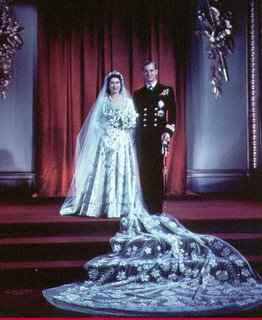Monday, November 27, 2006
Wednesday, November 22, 2006
The Real Bond
 I did notice something disturbing in the new Bond film, no not the 'private parts' torture scene, I mean something even more disturbing...During a dialogue scene between Bond and Vesper Lynd, they let drop that Bond was a poor, middle-class scholarship boy at Oxford, hence the very large chip on his shoulder...This, of course, is nothing by egalitarian propaganda, and should be set straight forthwith...
I did notice something disturbing in the new Bond film, no not the 'private parts' torture scene, I mean something even more disturbing...During a dialogue scene between Bond and Vesper Lynd, they let drop that Bond was a poor, middle-class scholarship boy at Oxford, hence the very large chip on his shoulder...This, of course, is nothing by egalitarian propaganda, and should be set straight forthwith...The Real Bond:
November 11, 1921: Bond is born into a wealthy family to a Scottish father, Andrew Bond of Glencoe, and a Swiss mother, Monique Delacroix, from the Canton de Vaud.
Because his father was a foreign representative of the Vickers armament firm, Bond's early education was entirely abroad in France, Germany, Austria, and Switzerland. Bond developed fluent command of French and German while in Europe.
July 5, 1933: Bond's parents die in climbing accident in the Aiguilles Rouges above Chamonix, France. After this tragedy, Bond is placed under the guardianship of his aunt, Miss Charmain Bond, and lives with her in the hamlet of Pett Bottom near Canterbury in Kent, England. Bond inherits his father's money (1ooo pounds per year) and his 1930 41/2 litre Bentley with supercharger by Amherst Villiers. Bond completes his pre-public schooling under his aunt's care.
1935-1936: Bond attends Eton College. During his school break/holiday time, Bond spends much of it in Austria and Switzerland with Hannes Oberhauser who is something of a father figure to Bond. He teaches Bond how to ski at the Hannes Schneider School at St. Anton in Arlberg, Austria. Bond also does some mountain climbing during this time.
1936 - 1938: Bond is removed from Eton due to an alleged incident with one of the boys' maids. Bond's aunt manages to get him transferred to Fettes College which was his father's old school. Fettes is located on the lands of Comely Bank, Edinburgh, Scotland. Bond continues to spend school breaks/holidays in Austria and Switzerland. He also becomes an avid golfer and plays at the Royal St. Marks Golf Course during the golfing season. Bond also attended the University of Geneva while in Switzerland.
Note: Hannes Oberhauser is killed under mysterious circumstances just after World War II. Later Bond is able to use his position in the British Secret Service to hunt down the murderer and exact revenge. See the short story "Octopussy".
1938 - 1949: An old Vickers colleague of Bond's father sends a letter of introduction for Bond to the Admiralty. Bond claims to be nineteen in order to gain admission to the Admiralty. Bond was commissioned into the Special Branch of the Royal Naval Volunteer Reserves, ending the war with the rank of Commander. Bond works for SO/SOE throughout WWII, and transfers, with SOE, to the British Secret Service after the war.
1950: In December 1950, Bond becomes a Double-O agent and holds the agent number '007'.
In 1954 Bond was appointed a C. M. G. (Companion to the Order of St. Michael and St. George) and in 1964 he is offered a Knighthood, which he declines.
No middle-class scholarship boy here...
Monday, November 20, 2006
RCBA Quiz
 Mr. Elk has today's quiz...You know who I voted for...
Mr. Elk has today's quiz...You know who I voted for...Oh, and Mr. Elk, feel free to ban Mrs. P & C from commenting on important RCBA business.
What Ho?
Which Wooster and Jeeves Character Are You?

You are BERTIE WOOSTER! You're a bit of a git--but you are tremendously fun in every circ. And if there's anyone out there who objects to a bit of fun--well, let him biff off.
Take this quiz!
Pinched from Christine
Bloody Tarawa...
 In 1943, during World War II, U.S. Marines began landing on Tarawa and Makin atolls in the Gilbert Islands, encountering fierce resistance from Japanese forces but emerging victorious three days later.
In 1943, during World War II, U.S. Marines began landing on Tarawa and Makin atolls in the Gilbert Islands, encountering fierce resistance from Japanese forces but emerging victorious three days later.
Friday, November 17, 2006
Meet The Queen
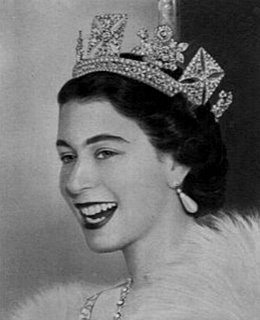 As noted by Mr. Cusack, Her Majesty Queen Elizabeth II and her consort The Prince Phillip, The Duke of Edinburgh (pronounced Edinburra) will visit the Commonwealth of Virginia for the upcoming celebrations surrounding the quatercentenary of the first permanent English settlement in the New World.
As noted by Mr. Cusack, Her Majesty Queen Elizabeth II and her consort The Prince Phillip, The Duke of Edinburgh (pronounced Edinburra) will visit the Commonwealth of Virginia for the upcoming celebrations surrounding the quatercentenary of the first permanent English settlement in the New World.I think this would be the perfect opportunity for you to ask her forgiveness and request re-entry into her Kingdom. Some pointers:
As an American you will want to dress in dirty cargo pants, ripped vest (t-shirt) sandals and backwards baseball hat over unkempt hair. Do not do this...Ask an Englishman for help and purchase a bespoke suit (with waistcoat) and shoes for the occasion. Bathe, shave and get a haircut, remove the jewellery form your face and ears, ensure all of your ridiculous tattoos are covered and do wear socks. Stand up straight and do not wear your usual half bottle of synthetic cologne. Her Majesty will appreciate the absence of odor.
Once you have gone through proper channels to arrange being presented to Her Majesty, and she deigns to acknowledge you:
You will greet the Queen as "your majesty" initially and "ma'am" thereafter
Do not extend your filthy hand toward Her Majesty for a handshake -If you are wearing gloves (being American you won't be, but just in case), remove them - One does not touch the Queen! Being an American, a Whig, a rebel and a probable fan of Lady Diana Spencer, if you were to reach towards the Queen, Her Majesty will assume you are trying to grope her and have you shot. If the Queen extends her hand (not bloody likely) you will shake very lightly and briefly...Do not mangle the Royal Knuckles...Light and Quick...
Do not speak unless spoken to...Keep your answers short and to the point...As an American you will want to tell her your life story and share your pathetic personal problems with her...Do not do this, if you do, she will assume you are deranged and have you shot.
Do not show the Queen your back, and leave the room only after the Queen does, unless of course you have made any of the mistakes above, then your lifeless body will no doubt leave the room before the Queen, which is acceptable.
One other point; technically if you are not a citizen of Great Britain you do not have to bow when greeting the Queen. But in this case, you should bow at the waist when presented, after all, you are hoping to be restored to her good graces...
There you are, do not muck this up.
What Makes Doctor Johnson Great?
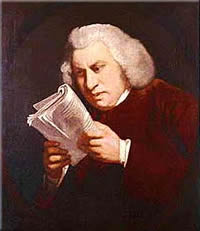
"A friend of mine, Russian by birth but English by adoption, who speaks English more elegantly and eloquently than most native speakers, once asked me of what, precisely, the greatness of Doctor Johnson consisted. He was asking only for information, in a spirit of inquiry; but the question took me aback, because the greatness of Doctor Johnson was something that I took for granted. If my friend had asked me to name a man whose greatness was his most salient characteristic, I think I would have named Doctor Johnson without a second thought.
“But,” my friend continued, “Doctor Johnson was a writer, and the greatness of writers is in their writing. Who reads him now, or feels the need to do so?” He added that he had never read him but still considered himself well-read in English literature.
Johnson’s quality of unreadness is not new and is equaled only by that of Walter Scott, whose once-famous historical romances are now read, I suspect, only rarely, and with a sinking heart and a sense of duty—even though Ivanhoe is allegedly Prime Minister Blair’s favorite reading. Carlyle, in his essay on Boswell’s Life of Johnson, says that the Life far exceeds in value anything Johnson wrote: “[A]lready, indeed,” says Carlyle, “[Johnson’s works] are becoming obsolete in this generation; and for some future generations may be valuable chiefly as Prolegomena and expository Scholia to this Johnsoniad of Boswell.” This was written in 1832, less than half a century after Johnson’s death, and as literary prophecy was not far from the mark. Boswell has many more readers than Johnson, and probably has had ever since Carlyle passed judgment..."
The Aeneid
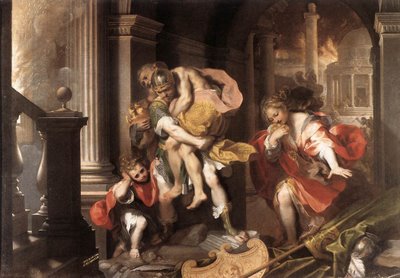
"THE EMPEROR WAS in the market for a blockbuster epic. It would be a gripping tale of conquest in fulfillment of a glorious destiny, and he would be its hero.
Rome was at long last entering a period of peace and prosperity after decades of political tumult and civil strife, and the strongman formerly known as Octavian calculated that the time was ripe for a literary masterwork that would herald a new world order and proclaim that it was all in keeping with a divine plan. The Greeks had their Homer; now it was Rome's turn.
But "The Aeneid," the magnum opus that Publius Vergilius Maro left not quite finished when he died in 19 BC, turned out to be something rather different than Augustus had in mind -- and a lot more than he bargained for. No boilerplate martial saga or dynastic docudrama, the poem was instead a vast mythological narrative about the founding of Roman civilization, boldly tracing the origins of Latin culture back to the crucible of Troy. And the starring role didn't go to Rome's current supreme ruler; the leading man was the legendary Trojan warrior Aeneas, a favorite son of Venus who had taken to sea with his vanquished legions as their citadel was razed to ashes, in search of a new dominion to call home..."
Personal Favourite
 Happy Birthday to Mary Elizabeth Mastrantonio (who would like to be M. E. Seal, I am sure)
Happy Birthday to Mary Elizabeth Mastrantonio (who would like to be M. E. Seal, I am sure)An Illinois girl...
Note: This infatuation has been approved by The Countess.
Thursday, November 16, 2006
Men's slippers...

The Albert of Basil Seal, by Shipton & Heneage
"My favourite part of childhood Christmases was the BBC's annual showing of The Slipper and the Rose. The word slipper had 10-year-old me roaring every time, as I imagined the gemmed-up Cinderella waltzing round the ball in the brown plaid chilblain-toasters my grandfather took to his grave.
You see, slippers are a footwear paradox - for men anyway. While they can be denizens of male hospital wards, they actually earned their place in cobbling history as velvet monogrammed extravaganzas. And they are going that way again. Indeed, it is not an exaggeration to say we are on the verge of a golden age of male slipperdom.
The modern slipper is heir to a comfort legacy stemming back to the 17th century, says Sue Constable, shoe heritage officer at Northampton Museums. Originally, they were house-shoes worn by gentlemen in a state of undress, which, mercifully, meant informal clobber, not nudity.
Back then, slippers were emblems of wealth. "Only those who could afford more than one set of clothes wore them," says Constable. Parading them in front of guests won cachet, not stigma. Entertaining in mules was a sign of breeding, not, as later, burlesque..."
Mr. Joke found a nice pair...
Saki: A Life of Hector Hugh Munro

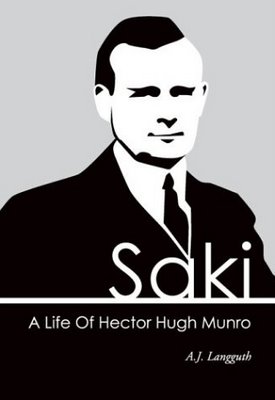 Christopher Morley wrote, "There is no greater compliment to be paid the right kind of friend than to hand him Saki, without comment."
Christopher Morley wrote, "There is no greater compliment to be paid the right kind of friend than to hand him Saki, without comment."Saki was the premier satirist and story-teller of the Edwardian world of Upstairs, Downstairs. His very name, Saki - pen name for Hector Hugh Munro - evokes that era of brittle elegance.
This biography, by A. J. Langguth, which is based on the writer's papers, is the first. It is itself a hilarious and quotable narrative of that soon-to-end world of extravagance.
H. H. Munro, his sister and his brother were brought up by two bad aunts because his father was serving in India in the Army and his mother (who had been sent home to safe England to deliver her fourth child) was kicked and killed by a bull in a pasture. The combination of accidents and backgrounds seems symbolic of Hector's life - the cliche upper-middle-class background, the myth of an England always and forever safe, the fairy-tale/nightmare bad aunts and the children who fantasize in the nursery, and the absurdity of the mother's death (and all of life). Young Hector was to follow a typical path of his day, and he was to become the best of the storytellers of his age. First off to public school, then rescued by his father, then to serve the Empire in Burma, next to write from abroad for the English speaking public - from the Balkans, from Russia during the abortive 1905 uprising, from France in the anarchic days before the Great War.
In the meantime, Sake had created a character, Reginald, who epitomized the languid, arch fop of the Edwardian age, and he had produced short stories which, at their best, Evelyn Waugh called masterpieces. He had written, as well, two novels.
Munro was never to strive for epic writing but was instead a brilliant, almost perfect miniaturist who would hold a reputation roughly akin to that of Oscar Wilde, Ronald Firbank or Nathanael West. He did leave behind a brilliant and hilarious chronicle about his times; he was the most arch of the humorists of his day, a diarist of the underbelly of Edwardian society and of the macabre, which he disguised only thinly in flawless and graceful prose.
Here is Saki, the slashing wit, praised and admired by his contemporaries - Evelyn Waugh, Graham Greene, A. A. Milne, Noel Coward - in a brilliant biography as well as critique of his work.
During his research, A. J. Langguth uncovered six stories by Saki never before collected. They are included in this volume.
H. H. Munro, refusing a commission, enlisted as a private soldier in 1914. He was killed by a German sniper on November 14, 1916.
Wednesday, November 15, 2006
Isandlwana - Rorke's Drift Reconsidered
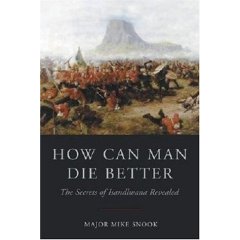

How Can Man Die Better: The Secrets of Islandlwana Revealed by Major Mike Snook-- Wednesday 22 January 1879 was one of the most dramatic days in the long and distinguished history of the British Army. At noon a massive Zulu host attacked the 24th Regiment in its encampment at the foot of the mountain of Isandlwana, a distinctive feature that bore an eerie resemblance to the Sphinx badge of the outnumbered redcoats. Disaster ensued. Later that afternoon the victorious Zulus would strike the tiny British garrison at Rorke's Drift. How Can Man Die Better is a unique analysis of Isandlwana, of the weapons, tactics, ground, and the intriguing characters who made the key military decisions. Because the fatal loss was so high on the British side there is still much that is unknown about the battle until now. Mike Snook is the first military professional to scrutinize the battle in print since 1879. He has an unparalleled grasp of the nuances of the ground at Isandlwana and of their implications in practical military terms. Most compellingly he has an instinctive feel for the characters who forged this supremely dramatic history, for this is family history, the battle was fought by soldiers of the author's own regiment. This is a work of unparalleled depth, which eschews the commonly held perception that the British collapse was sudden and that the 24th Regiment was quickly overwhelmed. Rather, there was a protracted and heroic defence against a determined and equally heroic foe. The author reconstructs the final phase of the battle in a way that has never been attempted before. It was to become the stuff of legend, which the author brings to life so vividly that one can almost sense the fear and smell the blood. How Can Man Die Better is essential reading for anyone interested in Isandlwana, the wider Anglo-Zulu War or the Victorian Army.
Like Wolves on the Fold: The Defense of Rorke's Drift by Major Mike Snook --
Wednesday 22 January 1879 was one of the most dramatic days in the annals of military history. In the morning, a modern British army was swept aside by the onset of a seemingly unstoppable Zulu host at Isandlwana. Nearby, at a remote border outpost on the Buffalo River, a single company of the 24th Regiment and a few dozen recuperating hospital patients were passing another hot, monotonous day. News of the disaster across the river came like a bolt from the blue. Retreat was not an option. It seemed certain that the Rorke's Drift detachment would share the terrible fate of their comrades. Following on from How Can Man Die Better, Colonel Snook brings the insights of a military professional to bear in this strikingly original account. It is an extraordinary tale a victory largely achieved by the sheer bloody-mindedness in adversity of the British infantryman, fighting at the remarkable odds of over thirty to one. The heroics of all eleven VC winners are recounted in detail, and we are offered new insights into how the Zulu attack unfolded and how 150 men achieved their improbable victory. The author describes the remainder of the war, from the recovery of the lost Queen's Colour of the 24th to the climactic charge of the 17th Lancers at Ulundi. We return to Isandlwana to consider culpability, and learn of the often tragic fates of many of the war's participants. Like Wolves is a remarkable work, and the author's unbridled respect for the fighting qualities of British soldier and his abiding affection for the Zulu people shines through.
Very Funny...
 But, Bill Bryson always is.....One of the few writers who can make me laugh out loud...The Thunder Vision Death Ray scenes in this book are just hilarious...If you are of an age, and especially if you grew up in the middle west of America, you will see parts of your own childhood in this book, except here it will be a lot funnier.
But, Bill Bryson always is.....One of the few writers who can make me laugh out loud...The Thunder Vision Death Ray scenes in this book are just hilarious...If you are of an age, and especially if you grew up in the middle west of America, you will see parts of your own childhood in this book, except here it will be a lot funnier.Bill Bryson was born in the middle of the American century—1951—in the middle of the United States—Des Moines, Iowa—in the middle of the largest generation in American history—the baby boomers. As one of the best and funniest writers alive, he is perfectly positioned to mine his memories of a totally all-American childhood for 24-carat memoir gold. Like millions of his generational peers, Bill Bryson grew up with a rich fantasy life as a superhero. In his case, he ran around his house and neighborhood with an old football jersey with a thunderbolt on it and a towel about his neck that served as his cape, leaping tall buildings in a single bound and vanquishing awful evildoers (and morons)—in his head—as "The Thunderbolt Kid."
Using this persona as a springboard, Bill Bryson re-creates the life of his family and his native city in the 1950s in all its transcendent normality—a life at once completely familiar to us all and as far away and unreachable as another galaxy. It was, he reminds us, a happy time, when automobiles and televisions and appliances (not to mention nuclear weapons) grew larger and more numerous with each passing year, and DDT, cigarettes, and the fallout from atmospheric testing were considered harmless or even good for you. He brings us into the life of his loving but eccentric family, including affectionate portraits of his father, a gifted sportswriter for the local paper and dedicated practitioner of isometric exercises, and OF his mother, whose job as the home furnishing editor for the same paper left her little time for practicing the domestic arts at home. The many readers of Bill Bryson’s earlier classic, A Walk in the Woods, will greet the reappearance in these pages of the immortal Stephen Katz, seen hijacking literally boxcar loads of beer. He is joined in the Bryson gallery of immortal characters by the demonically clever Willoughby brothers, who apply their scientific skills and can-do attitude to gleefully destructive ends.
Warm and laugh-out-loud funny, and full of his inimitable, pitch-perfect observations, The Life and Times of the Thunderbolt Kid is as wondrous a book as Bill Bryson has ever written. It will enchant anyone who has ever been young.
Tuesday, November 14, 2006
Military Leadership
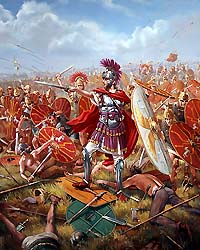
"Military leaders bestride the centuries capturing the attention of contemporaries and posterity. Names such as Caesar, Genghis Khan and Napoleon resound down the centuries. They indeed helped mould the contemporary world with their campaigns, but more than individual drive and ability were involved.
In addition, it is necessary to see how the campaigns of leaders interacted with the circumstances in which they operated. This is crucial because military success is a matter not of battle waged against an opaque background, but, instead, of the ability to fulfil objectives. In short, a task-based account of military achievement is necessary. This is key whether the leadership considered is at the tactical, operational or strategic levels.
These three levels are worthy of consideration because they indicate the variety of types of military leadership, and because to be a military leader at the highest level it was necessary to first succeed at the tactical level. There are exceptions, which we will come to, but let us fist consider the general case..."
The Ancien Regime of Hollywood
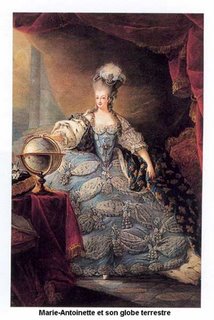
"Anachronism comes in different forms. Sometimes it is innocuous - no one who goes to see Julius Caesar is much affronted or discomposed when at one moment a character talks, anachronistically, about clocks. Occasionally it can be intellectually bracing, almost a form of aesthetic organisation, as in Virginia Woolf's Orlando. More often than not, however, it is simply crass.
Marie Antoinette falls squarely into category three, despite having aspirations towards category two. Anachronism is so profuse, so ubiquitous in this film that one can't imagine it was not deliberately entered into. And yet it seems to serve no end other than itself. Certainly, if the intention was to make the doomed French queen more accessible to us, and to invite us to participate imaginatively in her predicament, then it was laughably misjudged.
The result is that Marie Antoinette is best approached as an episode of The O. C. in fancy dress. Only residents of the Sonoma Valley, Palo Alto and Laguna Beach will find that this film speaks to their condition. For the rest of us, late eighteenth-century France has been rendered less, not more, accessible by being transposed into the mode of early twenty-first century California - a world which, for most of us, is more of a fantasy, more remote from our lives, more outlandish and straightforwardly weird, than the court of Louis XVI..."
Infatuation

Some blogging gentlemen hold certain young women dear...They admire them and follow their careers as some would a sporting hero. This is, of course, conducted in a most gentlemanly like fashion, and occurs from time to time when first one, then another young starlet catches their eye at the stage door...It is infatuation...I noticed that The Most Worshipful Maximum Leader Enthroned in the East is enamoured of a certain Miss Love-Hewitt for instance. I believe he admires her hair and delicate complexion. The Llama's, for reasons unknown to the rest of us, seem to be fixated on French women. To each his own, I suppose...
But I, being married to The Countess, live under a different set of rules, as it were. I am only allowed to fixate on Countess approved starlets. If they have not been approved, then you had better keep your fantasies to yourself. Of course the list of "trashy tramp women starlets whom we would not allow in the neighborhood let alone the house" is much larger than the "approved starlet we might invite to tea sometime" list. Every so often the Countess breezes by and informs me about some new starlet she has seen at the cinema, and tells me that "she is very cute and sweet and just my style, no really, I think you would really like her". I rarely partake of the visual arts, so I usually have no idea who the said starlet is. But that, of course, does not matter, what matters is that she has been "approved" so you better become a huge fan, and I mean now...
My current approved starlet is one Miss Emmy Rossum...I have no idea who she is, have never seen her in any film, but you know, I'm a huge fan!
Call me Ishmael...
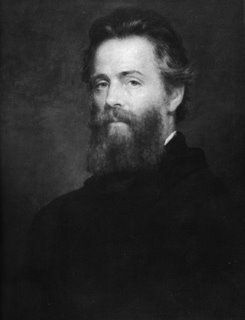 On November 14 in 1851, Herman Melville's novel "Moby-Dick" was first published.
On November 14 in 1851, Herman Melville's novel "Moby-Dick" was first published."Call me Ishmael. Some years ago -- never mind how long precisely -- having little or no money in my purse, and nothing particular to interest me on shore, I thought I would sail about a little and see the watery part of the world. It is a way I have of driving off the spleen, and regulating the circulation. Whenever I find myself growing grim about the mouth; whenever it is a damp, drizzly November in my soul; whenever I find myself involuntarily pausing before coffin warehouses, and bringing up the rear of every funeral I meet; and especially whenever my hypos get such an upper hand of me, that it requires a strong moral principle to prevent me from deliberately stepping into the street, and methodically knocking people's hats off -- then, I account it high time to get to sea as soon as I can. This is my substitute for pistol and ball. With a philosophical flourish Cato throws himself upon his sword; I quietly take to the ship. There is nothing surprising in this. If they but knew it, almost all men in their degree, some time or other, cherish very nearly the same feelings towards the ocean with me." Chapter 1, Loomings, MOBY DICK
RCBA News
 100 years ago on November 14, 1906 Louise Brooks was born in Cherryvale, Kansas...
100 years ago on November 14, 1906 Louise Brooks was born in Cherryvale, Kansas...Happy Birthday from the RCBA.
Monday, November 13, 2006
Famous Last Words...
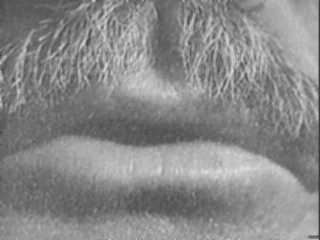
My famous last words will be: "Goodbye. I am leaving because I am bored."
What will your famous last words be?
Blatantly pinched from RW...
Friday, November 10, 2006
Good News Flash (man)

Young Lord of the Manor says to heck with castle life...
Journalist fresh from the Highlands takes Manhattan by storm...
Mr. and Mrs. P call Pope, Cusack gets job...
Knickerbocker Peasants' and Nobles' Movement and Agrarian Union reject Cusack - Takes job at The New Criterion out of spite...
Feudal Times and Reactionary Herald out Cusack as a slave to unsustainable corporate agriculture - Holds celebratory dinner at MacDonalds - Orders two Big Macs and supersizes for everyone...
The fin de siècle poet Enoch Soames and man-about-Mayfair Sir Basil Seal lobby Mr. and Mrs. P for Cusack - Some claim broken links behind this move...
Bad Boy out - Good Boy in at The New Criterion
With Bad Boy gone some say socks will be mandatory with seersucker under Cusack...
Some worry about Rome's influence at TNC with Cusack now on board...
Fiendish Lout very happy - Some fear too happy
Some worry - Can Boy Mulcaster handle Cusack?
Fancy meeting you here....
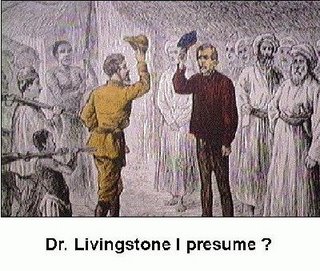
Sir Henry Morton Stanley was a remarkable man. Orphaned at an early age he spent his formative years in a workhouse in Wales, crossed the Atlantic at age 15 as a crewman of a merchant ship and jumped ship in New Orleans. Befriended by a local merchant, he took the man's name - Henry Stanley - as his own and went on to fight in the Civil War before working his way into a career in journalism. (see The Battle of Shiloh, 1862)
Leading an expedition of approximately 2,000 men, Stanley headed into the interior from the eastern shore of Africa on March 21, 1871. After nearly eight months he found Livingstone in Ujiji, a small village on the shore of Lake Tanganyika on November 10, 1871.
History Men
 Peter Hitchens:
Peter Hitchens:"I am asked about what to read if you feel the urge to know more history but aren't interested in academic tomes. Here are a few suggestions: One absolute recommendation is the Flashman series, by George MacDonald Fraser. Some of these books are works of genius, some merely brilliant, but each is beautifully researched and tells the truth about the Victorian era in many different aspects. Several C.S.Forester novels, especially 'Death to the French', bring the past wonderfully to life. The essays and journalism of George Orwell, beautifully written, are a fine introduction to the ferment of the 1930s, the real atmosphere of war and of post-war Britain. Several Evelyn Waugh novels, especially the 'Sword of Honour' trilogy and 'Put out more flags' also tell you much about what England was really like in living memory, and tell some bitter but true stories about warfare. If you can get John Harris's 'Covenant with Death', you will find a clear, believable but fictional account of an astonishing story from another war - the men (described so well in Larkin's poem 'MCMXIV') who rushed to the colours in 1914 and died by the thousand on the Somme less than two years later..."
Continue...
Mr. Hithchens does not mention Patrick O'Brian, but I would...
Thursday, November 9, 2006
I warned you...
 I asked you to speak with Her Majesty...But no, you wouldn't listen...So now you must all face the consequences...So sorry.
I asked you to speak with Her Majesty...But no, you wouldn't listen...So now you must all face the consequences...So sorry.
Tuesday, November 7, 2006
God Save the Queen
 Election Day in the colonies...All you have to do is to say you're sorry and ask her to take you back...It really is your only hope. You tried and failed, no shame in that...But you are in serious need of some Dead White Male Geniuses...And they're all gone...Call it a day before someone gets hurt, or you put an eye out...
Election Day in the colonies...All you have to do is to say you're sorry and ask her to take you back...It really is your only hope. You tried and failed, no shame in that...But you are in serious need of some Dead White Male Geniuses...And they're all gone...Call it a day before someone gets hurt, or you put an eye out...
Monday, November 6, 2006
Etiquette For The Well-Dressed Man
 "...A while back he and I - along with Joke and Basil, the Man About Mayfair - formed an exceptionally loose confederacy, just to circle the wagons a bit in the face of the ever-growing tribe of sideways ballcaps and poorly fitted short pants in this wretched, wretched world...."
"...A while back he and I - along with Joke and Basil, the Man About Mayfair - formed an exceptionally loose confederacy, just to circle the wagons a bit in the face of the ever-growing tribe of sideways ballcaps and poorly fitted short pants in this wretched, wretched world...."Etiquette For The Well-Dressed Man
Thursday, November 2, 2006
“We had a Culture War and we lost.”

Since Pagans make the movies . . .
"Nearly all movies and entertainment are made by pagans for pagans. That doesn’t mean that a Christian can never find anything to like or love in such things. It does mean that there are some things, though, which a Christian is obligated to hate.
All modern pagan entertainment is premised on a lie or lies. One, that God is not truth. Two, if there is a God, he (or she, they would insist) is unknowable. Three, that life is basically meaningless but people pretend otherwise. Four, that people have no right to tell others how to live. Five, that sexual desire is uncontrollable so why bother trying. Six, that justice and revenge are the same thing. Seven, it is more fun to be emotional and irresponsible than sober and adult. (Make your own list from here.)
Since the human heart is made to seek and know God, even unconsciously, pagans often mix in themes which are responsive to that need such as people seeking redemption for their suffering, forgiveness for their cruelties; people changing their character as a result of conflict taken to some extreme, people converting from evil or indifferent attitudes to positive ones, people seeking justice for wrongs done to them, and people wanting to improve themselves - to love and be loved.
But pagan entertainment by its very nature is generally poisonous even when its trying to be positive because it gets the very basic truths of life wrong, or it uses half-truths that neatly seduce the inattentive into accepting ambiguities or falsehoods which condition perception and opinions that lead people away from truth and right action (righteousness).
The fact that most Christians are wishy washy, hypocritical, self-indulgent, weak, and tolerant of immorality doesn’t change the Ten Commandments or other injunctions against sin. That some Christians justify their weakness and lack of zeal for Truth is where the greater shame lies. At least a hypocrite knows what’s right but fails to do it. He has hope, at least, that someday he might improve or believes he should and it would be better if he did. But the one who accepts lies for truth, justifies falsehood, he ought to fear the outer darkness.
But he doesn’t because he claims he’s “saved”. He made the alter call, got baptized and confirmed, goes to church filled with nice people and undemanding sermons or simply scoffs at narrow minded injunctions and unsophisticated prohibitions.
Wednesday, November 1, 2006
Cappella Sistina
 On November 1, 1512, Michelangelo's paintings on the ceiling of the Sistine Chapel were first exhibited to the public.
On November 1, 1512, Michelangelo's paintings on the ceiling of the Sistine Chapel were first exhibited to the public.
All Saints' Day
 The vigil of this feast is popularly called "Hallowe'en" or "Halloween".
The vigil of this feast is popularly called "Hallowe'en" or "Halloween". Solemnity celebrated on the first of November. It is instituted to honour all the saints, known and unknown, and, according to Urban IV, to supply any deficiencies in the faithful's celebration of saints' feasts during the year.

